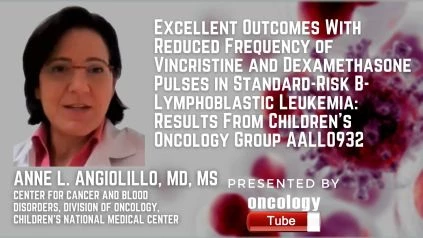Anne L. Angiolillo, MD, MS, director of the Leukemia and Lymphoma Program at Children’s National Medical Center speaks about the Excellent Outcomes With Reduced Frequency of Vincristine and Dexamethasone Pulses in Standard-Risk B-Lymphoblastic Leukemia: Results From Children’s Oncology Group AALL0932.
Link To Study –
https://ascopubs.org/doi/abs/10.1200/JCO.20.00494
Abstract -Â
PURPOSITY:
In order to optimize disease-free survival (DFS) thus reducing the burden of therapy in children with newly diagnosed NCI standard-risk (SR) B-acute lymphoblastic leukemia, AALL0932 tested two randomized maintenance approaches (B-ALL).
AND METHODS:
AALL0932 enrolled 9,229 patients with B-ALL; 2,364 patients with a mean risk (AR) were randomly assigned to vincristine/dexamethasone pulses every 4 (VCR/DEX4) or every 12 (VCR/DEX12) weeks and to a starting dose of 20 mg/m2 (MTX20) or 40 mg/m2 once-weekly oral methotrexate every 4 (VCR/DEX4) or every 12 (VCR/DEX12) weeks at the start of maintenance therapy (MTX40).
RESULTATIONS:
For all qualifying and evaluable SR B-ALL patients (n = 9,226), 5-year event-free survival and overall survival (OS) from registration were 92.0 percent (95 percent CI, 91.1 percent to 92.8 percent) and 96.8 percent (95 percent CI, 96.2 percent to 97.3 percent), respectively. For randomly allocated AR patients, the 5-year DFS and OS from the start of maintenance were 94.6 percent (95 percent CI, 93.3 percent to 95.9 percent) and 98.5 percent (95 percent CI, 97.7 percent to 99.2 percent), respectively. For patients randomly assigned to receive VCR/DEX4 (n = 1,186) versus VCR/DEX12 (n = 1,178), the 5-year DFS and OS were 94.1 percent (95 percent CI, 92.2 percent to 96.0 percent) and 98.3 percent (95 percent CI, 97.2 percent to 99.4 percent) v 95.1 percent (95 percent CI, 93.3 percent to 96.9 percent) and 98.6 percent (95 percent CI, 97.7 percent to 99.6 percent) respectively (P = 95.1 percent) v 95.1 percent (95 percent CI, 93.3 percent to 96.9 percent) For AR patients randomly assigned to receive MTX20 versus MTX40, the 5-year DFS and OS for AR patients were 95.1 percent (95 percent CI, 93.3 percent to 96.8 percent) and 98.8 percent (95 percent CI, 97.9 percent to 99.7 percent) versus 94.2 percent (95 percent CI, 92.2 percent to 96.1 percent) and 98.1 percent (95 percent CI, 97.0 percent to 99.2 percent) versus 94.2 percent (P = .92 and .89).
Observations:
Despite obtaining one-third of the vincristine/dexamethasone pulses previously used as standard of care in Children’s Oncology Community (COG) studies, the NCI-SR AR B-ALL that obtained VCR/DEX12 had outstanding results. Compared with 20 mg/m2 once weekly, the higher starting dose of MTX of 40 mg/m2 once weekly did not boost the performance. In order to minimize the burden of therapy for patients and their families, the reduced frequency of vincristine/dexamethasone pulses has been introduced into frontline COG B-ALL trials.

